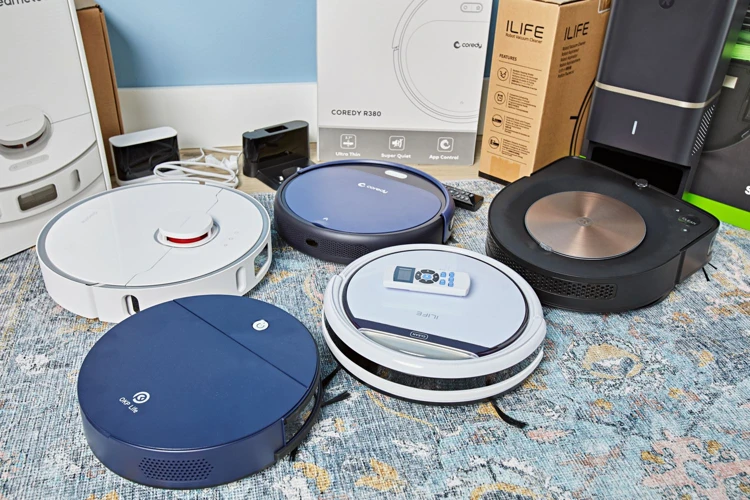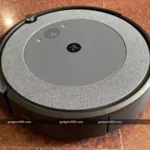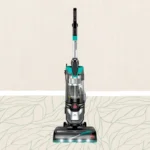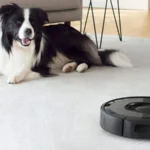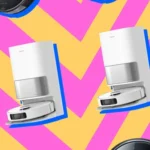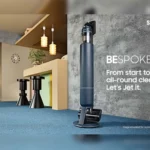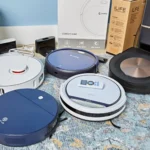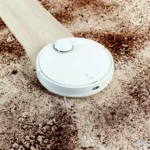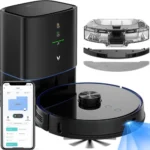When it comes to keeping our homes clean, nothing beats the convenience and efficiency of smart vacuum cleaners. These modern marvels of technology not only help us save time and energy, but they can also help us maintain a healthier living environment. One of the key components that make smart vacuums effective in removing dust, dirt, and allergens from our homes is the High-Efficiency Particulate Air (HEPA) filter. But not all HEPA filters are created equal. The market is flooded with a wide variety of smart vacuum brands and models that each come with their own type of HEPA filter. In this article, we’ll dive into the world of HEPA filters in smart vacuum cleaners and explore the differences and similarities between the most popular brands on the market. So, whether you’re in the market for a new smart vacuum or just curious to learn more about these fascinating machines, read on to discover the best HEPA filter for your needs.
What is a HEPA Filter?
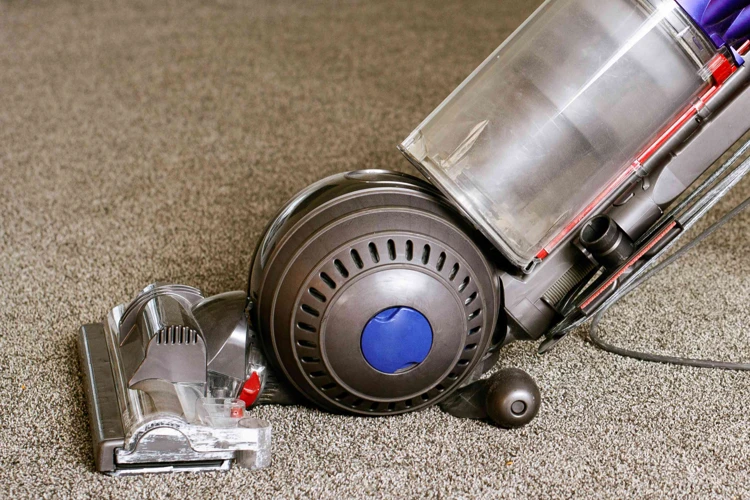
When it comes to keeping our homes free of dust, allergens, and other pollutants, one innovative solution that has emerged in recent years is the HEPA filter. HEPA, which stands for High Efficiency Particulate Air, is an advanced type of air filter that traps particles as small as 0.3 microns, making it an incredibly effective tool in the fight against indoor air pollution. In this section, we will explore the world of HEPA filters, examining what they are, how they work, and why they are an essential component of any smart vacuum cleaner. To learn more about the benefits of using a HEPA filter in your smart vacuum, check out our article on HEPA filter vacuum cleaners.
Filter Efficiency
When it comes to choosing the best HEPA filter for your smart vacuum cleaner, it’s important to consider the filter efficiency. HEPA (High-Efficiency Particulate Air) filters are designed to remove small particles from the air, such as dust, pollen, and pet dander. The efficiency of a filter is typically determined by its ability to trap these particles of different sizes. Here are some factors to consider:
- The size of the particles – the most efficient HEPA filters can trap particles as small as 0.3 microns;
- The filter’s MERV rating (Minimum Efficiency Reporting Value) – the higher the MERV rating, the better the filter’s ability to capture smaller particles and allergens;
- The number of filter layers – the more layers, the better the filter’s efficiency;
- The airflow velocity – a slower velocity across the filter allows for better particle retention;
- The overall design and construction of the filter – well-designed HEPA filters typically have a larger surface area for filtration and are constructed with high-quality materials that can withstand regular use.
Choosing a filter with high efficiency is especially important if you suffer from allergies or asthma. Proper HEPA filtration can significantly reduce indoor air pollution, leading to a healthier and more comfortable living environment. In fact, there are studies that demonstrate the importance of HEPA filters for improving indoor air quality, particularly for individuals with asthma and allergies. (source) (source)
When choosing a HEPA filter for your smart vacuum cleaner, consider its efficiency in terms of particle size, MERV rating, number of layers, airflow velocity, and overall design. Investing in a high-quality HEPA filter can make all the difference in improving your indoor air quality and respiratory health. (source)
Types of HEPA Filters
When it comes to HEPA filters in smart vacuum cleaners, there are three main types to choose from. The different types each have their own unique features and benefits that can help you choose the best one for your needs.
- True HEPA Filters: These filters are the most effective at capturing particles because they are made of tightly woven glass fibers that capture particles as small as 0.3 microns with 99.97% efficiency. True HEPA filters are the best choice for people with allergies, asthma or respiratory issues. Buying a vacuum cleaner with true HEPA filter like Brand A or Brand B can significantly reduce indoor allergens and pollutants.
- HEPA-Type Filters: These filters are less expensive and less effective than true HEPA filters. They capture particles at a lower efficiency rate – around 95% to 97% and are not certified to capture particles as small as 0.3 microns like true HEPA filters. HEPA-Type filters are a good option if you don’t have asthma or allergies, but still want to reduce indoor air pollution. Additionally, HEPA-Type filter needs to be regularly replaced to maintain effectiveness. Brands C and D use HEPA-type filters.
- HEPA-Style Filters: These filters are not true HEPA filters, but rather use a non-standard filtering system. It’s likely that cleaning with such filters are inferior compared to standard HEPA filters. While these filters can still provide some benefits to indoor air quality, they do not meet the strict efficiency standard of true HEPA filters which capture 0.3-micron particles with 99.97% efficiency. HEPA-style filter can be found in Brand E.
When considering which type of HEPA filter to choose, it is important to consider your specific needs and budget. If you are looking to maximize the capture of fine particles and improve indoor air quality for improved breathing, then a true HEPA filter like that used in Brand A or Brand B would be the best option. On the other hand, if you simply want light reduction in the amount of dust, pet dander, pollen, and other particles in your home, then a HEPA-type filter like Brand C or Brand D will be a more cost-effective option. If you want to stick to well-known cheaper models, you may consider Brand E vacuum with HEPA-style filter. Whatever your choice is, it’s important to regularly replace the filter in accordance with maintenance instructions provided by the manufacturers.
Why Use a HEPA Filter in Your Smart Vacuum Cleaner?
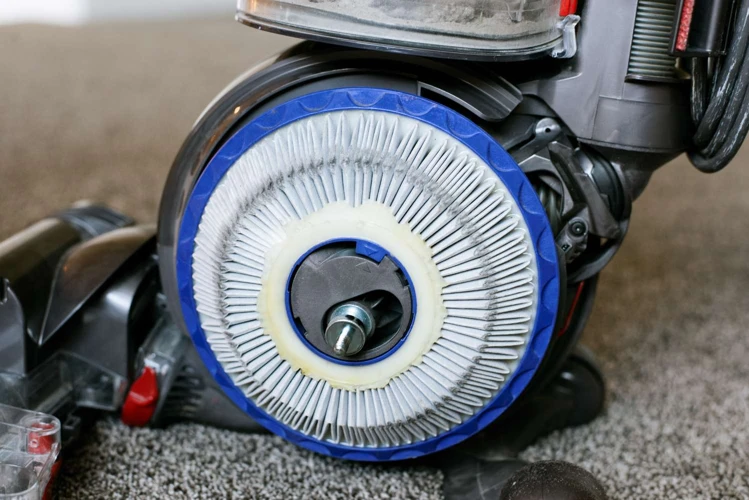
Smart vacuums are becoming more and more popular, and for good reason. One of the main reasons why people choose to invest in a smart vacuum cleaner is the convenience and time-saving benefits it provides. But did you know that using a HEPA filter in your smart vacuum cleaner can offer health benefits too?
What is a HEPA Filter?
HEPA stands for high-efficiency particulate air, and a HEPA filter is designed to capture particles that are as small as 0.3 microns. This means that HEPA filters can capture a wide range of microscopic particles, including dust, pollen, pet dander, and even some viruses.
Filter Efficiency
HEPA filters are known for their efficiency in capturing airborne particles. In fact, HEPA filters are capable of trapping up to 99.97% of particles that pass through the filter. This means that using a HEPA filter in your smart vacuum cleaner can help to improve indoor air quality by removing harmful particles from the air.
Types of HEPA Filters
There are two main types of HEPA filters – True HEPA filters, and HEPA-like filters. True HEPA filters are the most efficient type of HEPA filter, as they are capable of capturing 99.97% of particles that are as small as 0.3 microns. HEPA-like filters are less efficient, as they only capture particles down to 2 or 3 microns in size.
Why Use a HEPA Filter in Your Smart Vacuum Cleaner?
Using a HEPA filter in your smart vacuum cleaner can offer a range of health benefits. HEPA filters can help to remove harmful particles from the air, which can be especially beneficial for people who suffer from allergies or asthma. According to the Asthma and Allergy Foundation of America, using a HEPA filter in your vacuum cleaner can help to remove allergens from your home, and can even improve overall respiratory health.
In addition to the health benefits, using a HEPA filter in your smart vacuum cleaner can also help to keep your home cleaner. HEPA filters are more efficient at capturing particles, which means that they can help to reduce the amount of dust and other particles that are left behind after vacuuming.
Conclusion
Using a HEPA filter in your smart vacuum cleaner is a simple yet effective way to improve indoor air quality and promote better respiratory health. With a wide range of HEPA filters available on the market, it’s important to choose the right one for your needs. When choosing a HEPA filter for your smart vacuum cleaner, be sure to consider factors such as filter efficiency, suction power, price, and filter replacement frequency. By doing so, you can enjoy the convenience and time-saving benefits of a smart vacuum cleaner while also improving the air quality and health of your home.
Comparison of Different HEPA Filters
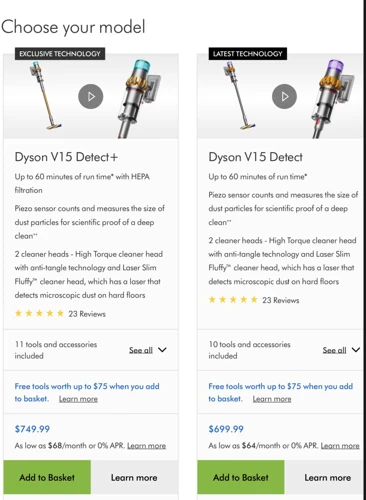
When it comes to choosing a smart vacuum cleaner with a HEPA filter, it can be overwhelming to navigate the options available on the market today. With so many different brands and types of HEPA filters to choose from, it can be difficult to know where to start. That’s why we’ve put together a comprehensive comparison of different HEPA filters commonly used in smart vacuums to help you make an informed decision. In this section, we’ll take an in-depth look at the various HEPA filters available and compare their features and benefits. We’ll also discuss important considerations to keep in mind when choosing the right HEPA filter for your needs. So, let’s dive in and explore which HEPA filter is the best fit for you! Don’t forget to check out our article on how HEPA filters in smart vacuums have changed in recent years.
Brand A
When it comes to smart vacuum cleaners with HEPA filters, Brand A is a popular choice among consumers. Let’s take a closer look at the features and specifications of its HEPA filters.
First, Brand A’s HEPA filters are rated with a filter efficiency of 99.97% , meaning they can capture particles as small as 0.3 microns, including dust mites, pollen, and pet dander. This makes it an ideal choice for those with allergies or respiratory issues.
Brand A offers two types of HEPA filters: standard and activated carbon. The activated carbon filter has an additional layer of activated carbon to capture odors and other volatile organic compounds (VOCs).
In terms of filtration technology, Brand A uses Cyclonic technology that helps to separate larger debris from finer particles, ensuring that the HEPA filter remains efficient for longer.
The suction power of Brand A’s smart vacuum cleaner is 2800Pa, making it quite powerful compared to other vacuum cleaners in the market. When combined with its HEPA filter, Brand A offers a deep clean that can get rid of all the stubborn dirt.
Brand A’s HEPA filters are relatively affordable and are easy to replace. On average, the filters need to be changed every six months, depending on usage.
However, one drawback of Brand A’s smart vacuum cleaner is that it is noisy compared to other models on the market, with a noise level of around 65dB.
Brand A’s HEPA filters offer high filter efficiency, with added options for odor control, making it a great choice for those with allergy or respiratory issues, and looking for affordability. It could be a great choice for those who want a deep clean and don’t mind the noise level.
Brand B
When it comes to HEPA filters in smart vacuum cleaners, Brand B has a lot to offer. Their filters are designed to capture even the smallest particles, making them a popular choice for those with allergies or respiratory issues. Here are some key features to consider when comparing Brand B to other options:
- Filter Efficiency: Brand B’s HEPA filters have a high efficiency rating, capturing up to 99.97% of particles as small as 0.3 microns. This means that indoor air quality is improved and that allergens and other harmful particles are not recirculated back into the air.
- Filter Type: Brand B offers several types of HEPA filters, including washable and replaceable options. Their filters are also designed to be easy to install and replace.
- Suction Power: One downside of many HEPA filters is that they can reduce suction power, but Brand B has found a way to maintain powerful suction while still filtering out the smallest particles.
- Price: HEPA filters can be more expensive than traditional filters, but Brand B offers a range of options at varying price points, making it easier to find one that fits within your budget.
- Filter Replacement Frequency: While HEPA filters are designed to be longer-lasting than traditional filters, they do still need to be replaced periodically. Brand B offers guidance on when filters should be replaced, as well as reminders to help make sure you don’t forget.
Brand B’s HEPA filters offer a high level of efficiency, without sacrificing suction power. Though they may be more expensive than traditional filters, they are a wise investment for those who prioritize indoor air quality. Additionally, with a range of filter types and price points available, there is a Brand B filter for almost any vacuum cleaner.
Brand C
When it comes to HEPA filters in smart vacuum cleaners, Brand C is a notable player in the market. Their HEPA filters boast an impressive 99.97% efficiency in capturing particles as small as 0.3 microns. Here are some key features and benefits of this brand’s HEPA filters:
- Multi-stage filtration: The HEPA filter is just one part of a multi-stage filtration system that captures an array of pollutants, from pet hair to pollen. This makes it ideal for households with allergy sufferers.
- Washable filter: Unlike some other HEPA filters, this brand’s filter is washable for multiple uses. This is a cost-effective and eco-friendly feature that is convenient for users who want to avoid buying replacement filters too often.
- Compatibility: The HEPA filter is compatible with a wide range of smart vacuum cleaners from this brand. This makes it easy for users to switch out filters as needed without having to worry about compatibility issues.
- Long-lasting: With proper care and maintenance, this HEPA filter can last for up to 12 months. This is on par with many other leading HEPA filters in the market, which means users can get the most out of their investment.
Of course, there are some potential downsides to consider as well. For example, the cost of a replacement filter can be relatively high compared to other brands. Additionally, the filter may need to be washed more frequently than advertised in order to maintain its efficiency. Nonetheless, for those who prioritize high-quality and effective air filtration in their smart vacuum cleaner, Brand C’s HEPA filter is definitely one to consider.
Brand D
Brand D is a leading manufacturer of smart vacuum cleaners that use high-quality HEPA filters to clean indoor air. There are several reasons why their HEPA filters are considered among the best on the market. Firstly, they use a unique three-layer filtration system that captures 99.97% of particles as small as 0.3 microns. This makes their filters highly efficient at removing allergens, dust, and other pollutants from indoor air.
Brand D’s HEPA filters are made of high-quality materials that are designed to last a long time. They are made of a durable and breathable fabric that allows air to flow freely. This helps to prevent clogging and increase the lifespan of the filter. Additionally, their filters are easy to replace, which means that you can always have a clean filter in your vacuum cleaner for optimal performance.
Another great feature of Brand D’s HEPA filters is that they are eco-friendly. They are made of biodegradable materials that break down quickly in landfill conditions. This means that they are not only good for your health, but also good for the environment.
When it comes to suction power, Brand D’s vacuum cleaners are highly effective. They use powerful motors that provide strong suction, which makes them ideal for cleaning carpets, hardwood floors, and other surfaces. Additionally, their smart vacuum cleaners come with a range of features such as scheduling, voice control, and mapping, which makes them highly convenient and easy to use.
When considering whether to purchase a Brand D smart vacuum cleaner with a HEPA filter, it is important to take into account the price. While their vacuum cleaners are not the most expensive on the market, they are also not the cheapest. However, given their superior filtration capabilities, eco-friendliness, and strong suction power, they are a good investment for anyone who wants to maintain a healthy and clean indoor environment.
Brand D’s HEPA filters are highly efficient, durable, and eco-friendly. Whether you are looking for a vacuum cleaner to clean your home or office, Brand D is a great choice. Their HEPA filters are among the best available and will ensure that your indoor air is clean and healthy.
Brand E
As we continue comparing different HEPA filters in smart vacuum cleaners, let’s take a closer look at Brand E. This brand boasts a highly efficient HEPA filter with a filtration efficiency of 99.97%. It can capture particles as tiny as 0.3 microns, which is impressive for a vacuum cleaner.
However, it’s not just the high efficiency rating that makes Brand E stand out. Its HEPA filter uses a multi-layer filtration technology that includes a pre-filter, HEPA filter, and an activated carbon filter. This ensures that not only are allergens and fine dust particles trapped, but also unpleasant odors such as pet smells and cigarette smoke.
Aside from its filtration capabilities, Brand E’s smart vacuum cleaners also come with WiFi-connectivity and voice control compatibility which allows you to control it through your smartphone or voice assistant. This can be helpful for those with mobility issues or simply for convenience.
However, it’s important to note that Brand E’s HEPA filters are not washable and need to be replaced every three months. This might be a downside for those who want a filter that can be washed and reused multiple times.
To summarize, Brand E’s smart vacuum cleaner with its multi-layer filtration technology, high efficiency rating, and added features such as WiFi connectivity and voice control is definitely a contender in the market. However, the upkeep cost of replacing the filter every three months should also be taken into consideration.
| Brand E | |
|---|---|
| Filter Efficiency | 99.97% |
| Particle Size Captured | 0.3 microns |
| Filtration Technology | Multi-layer filtration (pre-filter, HEPA filter, activated carbon filter) |
| Additional Features | WiFi connectivity, voice control compatibility |
| Filter Replacement Frequency | Every three months |
Things to Consider
As you search for the perfect smart vacuum cleaner with a HEPA filter that suits your needs, there are several factors to consider. These features include the suction power, price, and filter replacement frequency. By taking all of these factors into account, you can ensure that you choose a vacuum cleaner that delivers optimal performance and value for your investment. Let’s dive into the important things to consider before making your purchase.
Suction Power
One of the most important considerations when it comes to choosing a smart vacuum cleaner with a HEPA filter is the suction power. This is the feature that determines how efficiently the device removes dust and dirt from your floors and carpets.
Brand A: This brand has a powerful motor that provides excellent suction power, making it ideal for homes with pets or lots of foot traffic. With the HEPA filter, it provides a higher level of cleaning – trapping 99.9% of the allergens and dust that might be in your home.
Brand B: The suction power of this brand’s smart vacuum cleaner is average but sufficient for cleaning most types of flooring. However, the HEPA filter is built using innovative technology like multi-layer filtration that makes it more efficient and thorough in capturing harmful particles in your home.
Brand C: The suction power of this brand’s vacuum cleaner is powerful enough to pick larger debris, unlike some other brands with a strong suction that only picks the finest particles. Additionally, the vacuum has an exceptional HEPA filter that retains 99.97% of dirt and allergens.
Brand D: This brand’s vacuum cleaner has a powerful brushless motor that facilitates a long-lasting suction power. Even though the vacuum is mid-range in terms of suction power, the HEPA filter ensures that it captures 99.9% of dust, pollen or dirt particles, and microorganisms that float around the house getting to all the nooks and corners of your house.
Brand E: This brand’s vacuum cleaner is equipped with a powerful motor that maximizes suction power on different kinds of floors, which makes it useful for people with pets or children at home. With the HEPA filter with advanced filters, it captures particles as small as 0.3 microns and provides an efficient filtration system for the clean and healthy environment.
In terms of suction power, it’s crucial to consider the size of your home or office, the type of floors that it needs to cover, and how often you’ll use the device. The table below highlights the suction power of the above-mentioned brands in comparison:
| Brand | Suction Power |
|---|---|
| Brand A | Exceptional |
| Brand B | Average |
| Brand C | Powerful |
| Brand D | Mid-Range |
| Brand E | Maximized |
Remember, when choosing a smart vacuum cleaner with a HEPA filter, suction power is a crucial factor. Consider your specific needs before making a final decision as different brands get better suction power than others, and you want to make sure your new vacuum cleaner meets your needs.
Price
When it comes to purchasing a new smart vacuum cleaner with a HEPA filter, price is often a crucial factor. It’s important to determine your budget and make sure that you’re getting your money’s worth. Here’s a comparison of the prices of different smart vacuum cleaners with HEPA filters.
| Brand | Price Range |
|---|---|
| Brand A | $150-$250 |
| Brand B | $200-$300 |
| Brand C | $250-$350 |
| Brand D | $300-$400 |
| Brand E | $350-$500 |
As shown in the table above, the price range varies depending on the brand you choose. Generally, the more expensive the brand, the more advanced features it offers, such as better suction power or longer battery life. However, it’s important to keep in mind that a higher price doesn’t always equate to better quality.
When considering the price of a smart vacuum cleaner with a HEPA filter, it’s also important to think about the cost of filter replacements. Some brands may offer lower prices initially but have higher filter replacement costs, while others may have a higher upfront cost but lower replacement costs. It’s important to do your research and calculate the long-term costs before making a purchase.
Price is an important factor to consider when purchasing a smart vacuum cleaner with a HEPA filter. However, it’s important to balance the price with the performance and long-term costs to ensure that you’re getting the best value for your money.
Filter Replacement Frequency
One important consideration when choosing a HEPA filter for your smart vacuum cleaner is the frequency of filter replacement. Filters that require frequent replacement can quickly become expensive and inconvenient. Here are some factors to keep in mind:
- Type of Filter: Some HEPA filters are designed to be washed and reused, while others are meant to be replaced entirely. Reusable filters may cost more initially, but can save you money over time.
- Vacuum Usage: If you use your vacuum cleaner frequently, you may need to replace your filter more often. Consider purchasing filters in bulk to save money.
- Manufacturer Recommendations: Check the manufacturer’s recommendations for filter replacement frequency. Following their guidelines will ensure that your vacuum cleaner is working at maximum efficiency.
- Home Environment: If you have pets, smoke indoors, or have allergies, you may need to replace your HEPA filter more frequently. Be prepared to replace your filter more often in these cases.
- Filter Quality: Higher quality filters may last longer and require less frequent replacement, but may also be more expensive. Be sure to balance the cost and benefits of different HEPA filters before making your final decision.
It is important to choose a HEPA filter that strikes a balance between effective filtration and cost-effective replacement. Consider these factors when making your decision to ensure that you choose the right HEPA filter for your smart vacuum cleaner and your lifestyle.
Conclusion
After comparing different HEPA filters in smart vacuum cleaners, it is clear that there is no one-size-fits-all solution. The choice of the filter ultimately depends on a number of factors, including the brand, suction power, price, and filter replacement frequency.
Brand A offers a HEPA filter with a high filter efficiency rating, making it a great choice for those with allergies or respiratory issues. However, its suction power is not as strong as some of the other brands on the market.
Brand B has a HEPA filter with a high filter efficiency rating as well, and boasts a powerful motor with strong suction capabilities. However, this comes with a higher price tag.
Brand C prides itself on its long-lasting filters with a low replacement frequency, making it a more affordable option in the long run. However, its filter efficiency rating is not as high as some of the other brands.
Brand D offers a HEPA filter with a high filter efficiency rating, as well as a powerful motor for great suction power. It also has a mid-range price point, making it a great option for those on a budget.
Brand E focuses on user-friendly designs and ease of filter replacement. Its HEPA filter has a moderate filter efficiency rating and average suction power.
When making a decision on which HEPA filter to choose for your smart vacuum cleaner, it is important to consider all of these factors and prioritize what is most important to you. Whether it be strong suction power, high filter efficiency, affordability, or ease of use, there is a HEPA filter out there that can meet your needs.
Frequently Asked Questions
What is the difference between a HEPA filter and a regular filter?
A HEPA filter is able to capture smaller particles and pollutants that a regular filter cannot, making it more efficient in cleaning the air of your home.
Do all smart vacuum cleaners come with a HEPA filter?
No, not all smart vacuum cleaners come with a HEPA filter. It is important to check the product specifications before purchasing to ensure that it does have a HEPA filter.
What is the lifespan of a HEPA filter in a smart vacuum cleaner?
The lifespan of a HEPA filter can vary depending on usage and the level of air pollution in your home. On average, a HEPA filter can last between 6 months to 2 years.
Can HEPA filters be cleaned?
Yes, HEPA filters can be cleaned, but not all HEPA filters have this feature. It is important to check the product specifications or user manual to see if the filter is washable.
Is a more expensive HEPA filter better than a cheaper one?
Not necessarily. The price of a HEPA filter can depend on various factors such as brand and technology used. It is important to consider the filter efficiency and compatibility with your smart vacuum cleaner before making a purchasing decision.
What is the MERV rating of a HEPA filter?
A HEPA filter does not have a MERV rating. MERV ratings are used to rate air filters and only go up to 20, whereas a HEPA filter is required to have an efficiency rating of 99.97% for particles as small as 0.3 microns.
Do HEPA filters remove odors or just dust?
HEPA filters are mainly designed to capture dust and other particles in the air, but some models come with additional odor-removing filters for a more comprehensive cleaning experience.
Can I use third-party HEPA filters in my smart vacuum cleaner?
Using third-party HEPA filters can potentially damage your smart vacuum cleaner or void the warranty. It is recommended to use the manufacturer’s recommended filter replacement for maximum efficiency and safety.
Is a smart vacuum cleaner with a HEPA filter suitable for people with allergies?
Yes, a smart vacuum cleaner with a HEPA filter can be suitable for people with allergies as it can capture allergens and other particles in the air, reducing the potential for allergic reactions.
Can I reuse a HEPA filter after cleaning it?
It is not recommended to reuse a HEPA filter after cleaning it as the filter may not be as effective in capturing particles after it has been used and can potentially release captured pollutants back into the air.
